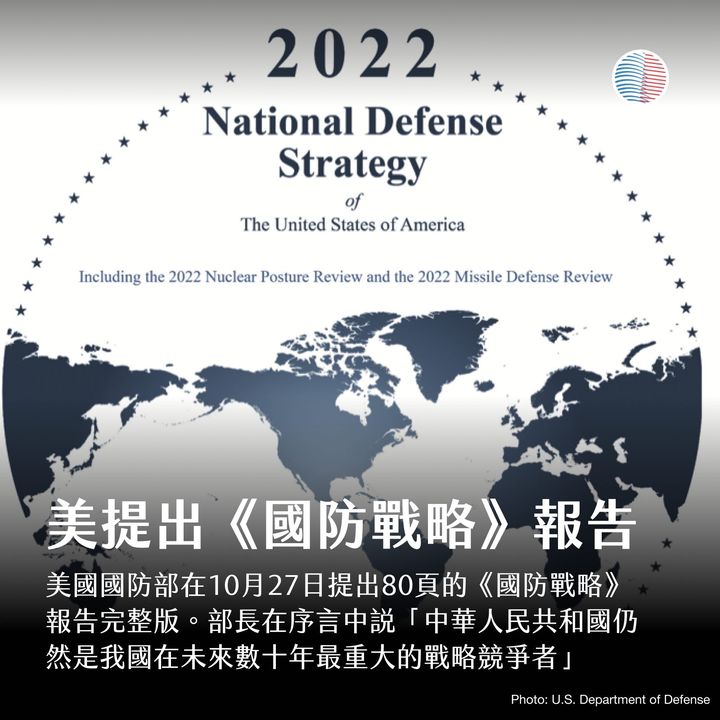【美國提出《國防戰略》報告完整版】
10/28/2022
美國國防部在今年3月28日將拜登政府版本的《國防戰略》(National Defense Strategy)提交國會,並公開摘要,經過半年之後,終於在10月27日、同時也是《國家安全戰略》(National Security Strategy)於10月12日公佈的兩週後,提出80頁的《國防戰略》報告完整版。 國防部長Lloyd Austin直接在序言就說:「中華人民共和國仍然是我國在未來數十年最重大的戰略競爭者」(PRC remains our most consequential strategic competitor for the coming decades.),並引用了拜登在《國家安全戰略》中提到的:「中華人民共和國是當前唯一一個有重塑國際秩序的意圖,也逐漸有經濟、外交、軍事、科技實力達到這樣意圖的國家」(the PRC is the only country with both the intent to reshape the international order, and, increasingly, the economic, diplomatic, military, and technological power to do so.)。 先來進行簡單的詞頻分析: 中國(PRC/China)出現 88 + 13 = 101 次,俄羅斯(Russia/Russian)出現89次,伊朗(Iran/Iranian)出現33次,北韓(North Korea)出現32次。 盟友部份,北約(NATO)出現40次,韓國(ROK)出現9次,日本(Japan)出現7次,澳洲(Australia)出現5次,印度(India)出現3次。 至於當前比較大的熱點部份,烏克蘭(Ukraine)出現13次,台灣(Taiwan)出現4次,以色列(Israel)出現3次,可見烏俄戰爭仍是目前美國的重中之重。其他可以對照的議題是拜登政府重視的氣候變遷(climate change)的13次,以及過去最重大的恐怖主義(terrorism/terrorist)的10次。 台灣出現的部份如下: 「中華人民共和國對台灣日趨挑釁的言辭及脅迫的行徑會造成動盪,造成誤判風險,並威脅台海和平穩定。」(The PRC's increasingly provocative rhetoric and coercive activity towards Taiwan are destabilizing, risk miscalculation, and threaten the peace and stability of the Taiwan Strait.) 「本部將基於中華人民共和國持續精進中的威脅,以及我國一中政策,支持台灣不對稱的自我防衛」(The Department will support Taiwan's asymmetric self-defense commensurate with the evolving PRC threat and consistent with our one-China policy.) 「本部將根據美國政策及國際法,支持盟友及夥伴的工作,以處理中華人民共和國為控制東海、台海、南海、及中印邊境等爭議邊界所採取的尖銳灰色地帶作戰」(The Department will also support Ally and partner efforts, in accordance with U.S. policy and international law, to address acute forms of gray zone coercion from the PRC's campaigns to establish control over the East China Sea, Taiwan Strait, South China Sea, and disputed land borders such as with India.) 回顧過去幾次的美國《國防戰略》,最近一次提到台灣已是在2008年的時候。當時版本中提到「中國持續現代化並發展軍事實力,主要為針對一場台海衝突,但也可能在其他事態中展現。」(China continues to modernize and develop military capabilities primarily focused on a Taiwan Strait conflict, but which could have application in other contingencies.)
US Taiwan Watch - Commentary and Analysis
Our team of editors and experts comment on the latest and most important events in the world and how they affect US-Taiwan relations. From geopolitics, security, and elections, to business, technology, and culture, this is where to find the freshest insights.

